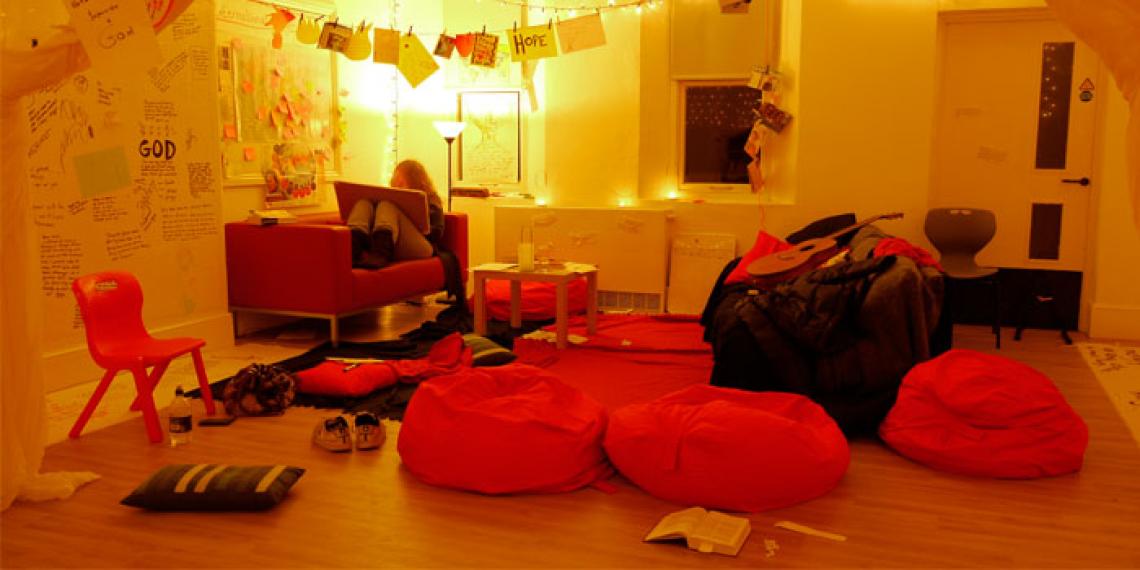You are here
Make space for prayer

We’re currently engaged in a 50 Days of Prayer campaign leading to our territorial congress in Manukau in 2 weeks time. Prayer rosters have been established across New Zealand, Fiji and Tonga so that no less than six people are praying for The Salvation Army’s mission and our upcoming congress gathering at any one time!
Experience has taught us that this kind of intensity in prayer is powerful and effective. Participating in something beyond our personalised prayer times can draw us into encounters with God in deeper and more meaningful ways.
The other dynamic of 24/7 Prayer that works powerfully is being present in a specially prepared prayer space, often a prayer room that has been set aside for this purpose. Within our corps and faith communities, people exercise their creativity to prepare such spaces—using colours, fabrics, art, candles, music, photography, and all manner of other aids to assist our praying. The special effort put into creating a prayer room is, in itself, a prayer.
I love entering these prayer rooms! I was almost going to write that they are truly sacred spaces in the midst of our busy centres, but I quickly arrested that thought. How can a quiet prayer space be called ‘more sacred’ than the busy space of service and attending to other’s needs? And surely, the sacred is to be found in midst of chaos as well as stillness? Of course, the answer to the first question is, ‘No, it can’t be called more sacred’, while the answer to the second is, ‘Yes, the sacred is often found in chaos as well as stillness!’
Fortunately, we don’t need to choose between one and the other! Both are vital to our experience of God. Stillness and solitude are vital for bringing us to a place of sacred encounter, while the often chaotic busy engagement with God in his mission is a necessary outworking of the life we receive in that space.
Establishing a prayer room is like the hospitality we extend when we host a dinner party. When we have dinner with friends, it’s usual to make a special effort to set the table and prepare the room so that everyone can enjoy the evening together. It’s not that we’re intending to create a false impression of this being how we do life all the time; we’re making this special effort simply for the sheer pleasure of it.
A prayer room at your corps, or a designated place of prayer at home can be like this. It is a place of hospitality for God. When we enter a prayer room, we’re making an intentional effort to recognise the presence of God and welcome him as we would a special friend. Of course, to make this connection, we’ve got to open the door.
There’s an account in Acts 12 where the apostle Peter had been in prison and the whole church was praying for his release. Miraculously, God intervenes and Peter escapes, returning to the house where the believers are praying. A servant called Rhoda responds to Peter’s knock at the door, but in her excitement at hearing his voice, she fails to open the door and he’s left standing outside. This is as ridiculous as our inviting friends for a meal and not letting them in when they arrive!
Revelation 3:20 talks about Christ standing outside the door of the church at Laodicea, knocking and asking to come in. This vibrant church had become distracted and indifferent to the things of God. Although maintaining some outward appearance of a legitimate God-relationship, the Laodicea church was more accurately depicted as having left God outside the door. This sad picture can also be true for us. Do we leave Christ ‘outside the door’ by ignoring his knock? Are we too busy, too cluttered, too unprepared to let him in?
The Salvation Army’s 50 Days of 24/7 Prayer campaign is a wonderful opportunity for us to open our doors to the God who loves to be in company with us, like a good friend sharing with us over a meal. I encourage you to make full use of the sacred prayer space prepared at your corps or centre. Enjoy it alone or with others. Make your own contribution which others following will share and enjoy. Use your prayer room as a place of hospitality where you welcome Christ’s presence. And go from there strengthened by the friendship you’ve enjoyed, to the service he has shown you to do.